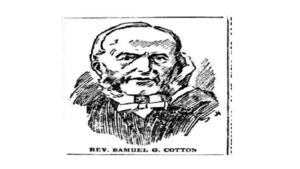The many court cases of a Kildare cleric

Rev Samuel Cotton
REVERNED SAMUEL Cotton after 14 years as rector of Kilberry parish transferred to Caragh Parish following the appointment of the previous incumbent Rev Arthur Archer to the parish of Donard.
This occurred in 1862 but some years previously Cotton married a Kilberry woman, Elizabeth Johnson, daughter of Major Henry Johnson of the 25th Royal Welsh Fusiliers.
There was no glebe house in Caragh and, for the first four or five years of his Caragh vicarage, Rev. Cotton is believed to have lived in Dublin.
It was while in Dublin that he joined the Dublin Protestant Orphanage Society and became it’s Assistant Secretary in 1864. He resigned a year later and immediately sought funds to build a Glebe House in Caragh and also an orphanage.
The lack of popularity which Rev Cotton experienced with his parishioners in Kilberry appears to have repeated itself with his Caragh parishioners. He himself noted having called vestry meetings in 1864, 1866 and 1868 which no parishioners attended.
The orphanage in Caragh appears to have been opened in 1865. Why did Cotton open the orphanage?
One can only surmise that the Church of Ireland fundamentalist saw it as an opportunity to secure Roman Catholic infants and young children to be brought up as members of the Church of Ireland. Very soon after the opening of the orphanage Rev Cotton was asked to admit six children belonging to a Protestant mother and a Catholic father.
Two of the children were forcibly abducted by the deceased father’s relations and those relations were subsequently charged at the Naas Assizes (court) following a complaint by Rev Cotton.
The Rev Cotton was himself before Robertstown petty sessions in 1869 for allegedly shooting at some individuals who taunted him on the public road.
Evidence was given that persons passing the Glebe House frequently shouted out at the Vicar. On the charge of discharging his pistol Cotton was found not guilty but the publicity added to the public’s growing awareness of the difficult vicar.
A week later the orphanage was attacked by a number of men but their efforts to break in were not successful. Rev Cotton was involved in a number of other court cases none of them relating to the orphanage but rather the vicar’s unusual behaviour.
The next court case concerned the orphanage involving the case of 10-year-old Elizabeth Daly who escaped from the orphanage in October 1871.
Rev Cotton had her charged with stealing the rags which she was wearing. The outcome is unknown while Elizabeth was returned to the orphanage.
A few years later a young mother, Kate Kelly, with her twin babies was refused admission to the orphanage. Kate was destitute and had 5 children all under the age of 6.
Kelly’s request to admit the two babies was refused and on leaving the orphanage the distraught mother with her two babies walked back towards Naas.
It was while on that journey that she drowned the children in the canal for which she was subsequently charged and sentenced to death.
The death sentence was then commuted to one of imprisonment. Rev Cotton immediately following the trial wrote to the press explaining the financial difficulties which led to rejecting the admission of the two infants.
Within a few months the press carried the story of four children, aged 12 years and under, who escaped from the orphanage. They were found by an Royal Irish Constabulary constable near Kilmeague in a hungry, unkempt state and dressed in rags.
The discovery of the children in such a dishevelled and malnourished state prompted the RIC Head Constable to call unannounced to the Caragh orphanage.
He found some children whose legs were chained to timber logs. Rev Cotton’s explanation was that the children in question had attempted to escape from the orphanage.
Rev Cotton was subsequently charged with aggravated assault of four orphan children. He was found guilty and he later filed an appeal which was heard at Naas quarter sessions in October 1883.
Acting for the state during that appeal was Athy Solicitor, Edward Lorde, whose name today is recalled in “Lords Island” which he had one time owned. The original fine imposed on Rev Cotton was reduced on appeal by half.
It was the next case involving Caragh orphanage which led to a prison sentence for the Caragh rector. Rev John Wilson, a Church of Ireland rector in County Armagh, arranged for seven children to be taken into the orphanage.
After some weeks Rev Wilson visited the children who he found to be neglected. Sometime later he revisited the orphanage with inspectors from the Society for the Prevention of Cruelty to Children following which the children were removed from Caragh.
Rev Cotton was charged with wilful neglect and mistreatment of the children and was arrested in Dublin on charge of manslaughter of 8 year old William Browne who had died in the orphanage in December 1879. Rev. Cotton was later charged with the manslaughter of another child.
The trial was scheduled for Carlow assizes in December 1891 and the Rev Cotton engaged Edward Carson to defend him.
The Carlow jury could not agree on a verdict and the case was referred for rehearing to the Queen's Bench in Belfast. The manslaughter charges were subsequently withdrawn and following a full hearing of the mistreatment within the Caragh orphanage Rev Cotton was found guilty and sentenced to six months imprisonment with a fine of £400.
He served his sentence in Mountjoy Jail and was released in January 1893.
Within a few months a complaint was made that Rev Cotton was again operating the orphanage in Caragh where two malnourished children were found. Rev Cotton appeared before Robertstown petty sessions and was returned for trial to the Naas Assizes.
The Naas jury returned a guilty verdict and a 12-month prison sentence in Kilkenny Prison was imposed.
Cotton was relieved of his clerical status and on his release from Kilkenny Prison in July 1885 he spent the rest of his days living in Green Park, Bray where the former Athy curate and Kilberry Vicar died on the 31 August 1900. His wife Elizabeth died on 4 September 1914.





